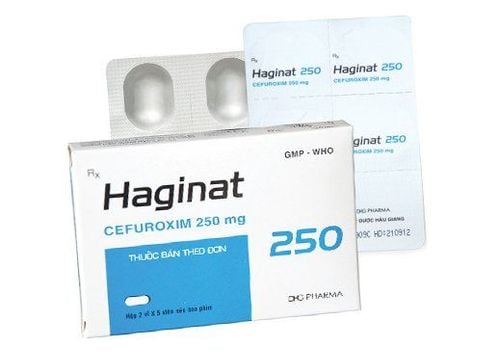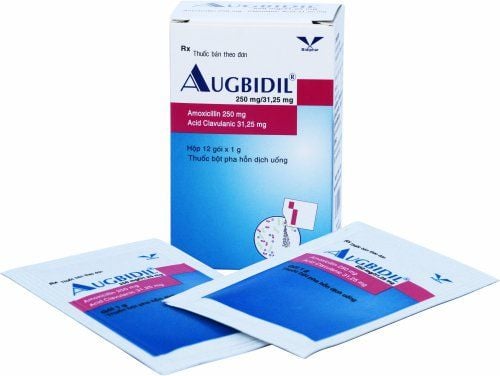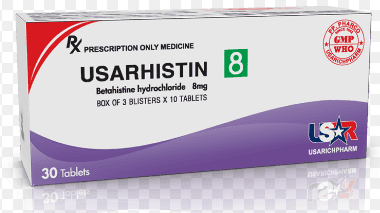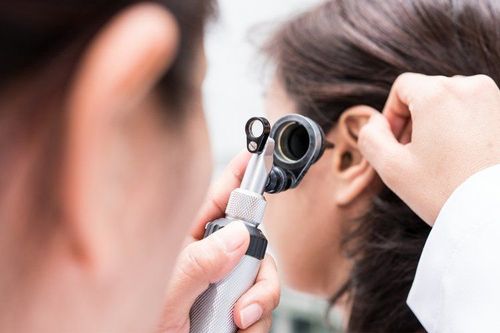This is an automatically translated article.
A perforated eardrum can heal on its own after a few weeks, but if the size of the hole is too large, it will be difficult to heal. In severe cases, a perforated eardrum can cause some serious complications, such as a middle ear infection or hearing loss.1. What is an eardrum perforation?
A perforated eardrum is a hole or tear in the eardrum, which separates the outer and middle ear canals. This damage can heal on its own in a few weeks without the need for intervention by treatments.However, if the puncture on the eardrum is too large and cannot heal after a long time, it can lead to serious complications if the patient does not treat it in time, it can even lead to infection. ear and hearing loss.
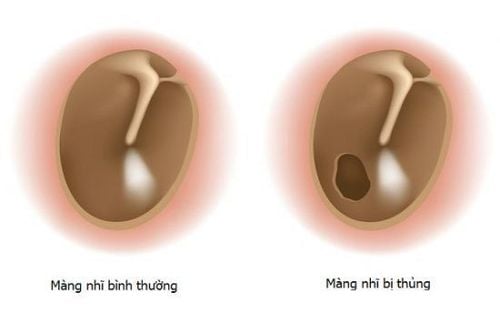
Thủng màng nhĩ là tình trạng xuất hiện một lỗ thủng hoặc vết rách trên màng nhĩ
2. Common symptoms of eardrum perforation
Some signs and symptoms of a perforated eardrum or an ear infection caused by a perforated eardrum typically include:Sudden loss of hearing. You may find it difficult to hear anything or your hearing may feel a little muffled Ear pain or pain in the inside of the ear Fluid leaking from the ear Itching inside the ear Feeling dizzy, sad vomiting or vomiting Tinnitus Temporary hearing loss These symptoms may go away once your eardrum has healed or any infection has been completely treated.
3. When to see a doctor?
You should see an otolaryngologist if:Suspect you have a perforated eardrum You have seen your GP and your symptoms have not improved after a few weeks, or an additional some new symptoms, such as fever, severe ear pain, itchy ears, or discharge from the ear A tear in your eardrum may heal in a few weeks without treatment, but your doctor The specialist may still order tests to check for infections and talk to you about home ear care options.

ạn nên đến gặp bác sĩ chuyên khoa tai mũi họng nếu nghi ngờ bản thân bị thủng màng nhĩ
4. Causes of perforation of the eardrum
A hole or tear in the eardrum can be caused by the following:Ear infections Pressure changes, such as during a plane ride or scuba diving Injury to the eardrum, for example such as being blown hard in the ear or having a sharp object penetrate the ear A sudden loud noise, such as an explosion
5. What complications can a perforated eardrum cause?
Some serious complications can occur if the perforation of the eardrum does not heal on its own after 3-6 months. Complications that patients may experience include:Otitis media (infection of the middle ear): harmful bacteria can easily enter the ear when your eardrum is punctured. It is this damage that creates a favorable environment for bacteria to multiply and grow, thereby increasing the risk of ear infections, causing serious otitis media. In severe cases, patients may have chronic or recurrent infections that are difficult to control and treat. Hearing loss: A perforated eardrum can cause temporary hearing loss, but it only lasts until the hole heals. However, if the tear is too large to heal after several weeks, hearing loss can become more severe. At this time, the patient needs to be treated through surgical measures to protect his hearing. Chronic otitis media with cholesteatoma: this is a rather rare complication of perforated eardrum. However, the extent of this complication's impact on hearing is often serious and requires early treatment. In fact, chronic otitis media with cholesteatoma is the result of a long-term perforation of the eardrum. It can cause cysts in the ear and contains proteins that can damage the bones of the middle ear.

Khi bị thủng màng nhĩ có thể gây ra triệu chứng mất thính lực tạm thời, nhưng nó chỉ kéo dài cho đến khi vết thủng lành lại
6. The method of plastic surgery of the eardrum
You may need surgery to repair holes in your eardrums if they are large or don't heal on their own in a few weeks. The type of surgery used to treat a perforated eardrum is called an eardrum effusion.This procedure is usually done in a hospital and the patient is given general anesthesia before the surgery. The tympanic membrane surgery process involves the following steps:
The surgeon makes a small incision just in front or behind the patient's ear, and then removes a small piece of tissue from under the skin. Next, the doctor will use a specialized small surgical instrument to patch the hole in the patient's eardrum with the same piece of tissue that has just been removed. A bandage is then placed on the patient's ear to keep the patch in place and to prevent water and germs from entering. The patient will have to keep this bandage in place for about 2-3 weeks. The skin incision will be sutured. Most patients can go home the same day or a day after surgery. It may take a few weeks for your eardrum to heal. About 2 or 3 weeks after surgery, you should have a follow-up visit to check the recovery of your eardrum.
7. Some risks of tympanic membrane surgery
Regardless of the surgical method, there are certain risks involved. For tympanic membrane surgery, there may be the following risks:Infection of the wound, causing pain, bleeding or leakage of fluid from the ear Tinnitus, if not treated in time, can lead to to permanent tinnitus Temporary or permanent change in taste Hearing becomes worse or loss of hearing, rarely permanent hearing loss Difficulty moving muscles in part of the face, however this will improve over time Before having surgery, you should talk to your specialist about the possible benefits and risks of surgery.

Sau phẫu thuật bệnh nhân có thể bị ù tai, nếu không được xử lý kịp thời có thể dẫn đến ù tài vĩnh viễn
8. Things you should do when your eardrum is punctured
While you wait for the wound to heal, the following tips can help reduce your symptoms and risk of an ear infection, including:Do not put anything in your ear, such as cotton swabs. or toothpicks (unless allowed by your doctor) Avoid getting water in your ears, don't swim, and be very careful when showering Try not to blow your nose too hard as this can damage the healing eardrum Restoration Apply a warm felt cloth to the ear to help relieve pain Take a pain reliever, such as ibuprofen or paracetamol (don't give aspirin to children under 16). At Vinmec International General Hospital, endoscopic or open eardrum patching surgery is performed depending on the condition and needs of the patient.
Vinmec gathers leading medical experts at home and abroad, a team of doctors with high professional qualifications, good skills, always enthusiastic, dedicated and wholeheartedly for the benefit of patients. The system of equipment for atrial patching technique ensures modern, optimal support for diagnosis and treatment. The medical examination and treatment space is modern, luxurious, polite and has an optimal infection control system. Professional medical service quality, bringing satisfaction and comfort to customers.
Please dial HOTLINE for more information or register for an appointment HERE. Download MyVinmec app to make appointments faster and to manage your bookings easily.
Articles refer to sources: webmd.com, nhs.uk, mayoclinic.org




